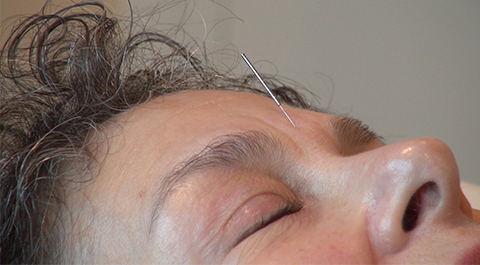Acupuncture For Cancer
October 27, 2016

Veronica remembers always being fatigued and nauseated during her chemotherapy treatments while battling breast cancer.
Her food tasted like aluminum. Medication meant to help gave her pain instead.
“I kept saying to myself, there has to be something for this,” Veronica said. “Then one of my doctors told me about acupuncture. I didn’t know anything about acupuncture.”
During her chemotherapy treatment, Veronica was introduced to Amy Sear, A.P., Dipl. O.M. a practitioner at Memorial Healthcare System’s Integrative Medicine.
After just a few weekly acupuncture sessions, Veronica said she immediately became a believer.
“I loved it. I was working through my chemo and felt like I was hit by a truck every day,” Veronica said. “The relief was immediate. I would always be looking forward to crawling into my safe space in Amy’s special bed to get acupuncture.”
Amy describes acupuncture as one of the treatment modalities within Chinese medicine. Its manual technique has been brought into the modern era, in a clean, professional, medical environment.
Acupuncture works on almost every condition including the numerous side effects experienced by cancer patients, she said. Its goal is to access points that have been charted in the body to correct issues in body systems.
“Most people use it for pain, but it works on everything from digestion to mood, sleep, skin, respiratory, cardiac, etc.,” Amy said.
While Amy works with all kinds of patients throughout Memorial Healthcare System, she provides most of her services within the Memorial Cancer Institute and works predominantly with breast cancer patients.
Many of her patients are currently seeking cancer treatments and are looking to make the process less difficult and to prevent side effects. Other patients, like Veronica, continue to seek acupuncture long after their cancer treatments are over.
Dr. Ashwin Mehta, Medical Director of Memorial’s Integrative Medicine, says acupuncture is part of the wellness program that applies the latest science in holistic approaches to optimize health.
Other methods/services provided by the integrative program include: massage; nutrition; yoga and exercise and mindfulness.
Integrative medicine can help if you have:
- Cancer
- heart conditions
- chronic pain
- weight management concerns
- poor sleep quality
- neuropathy
- headaches
- fatigue
- mood disorders
- bowel condition, including irritable bowel syndrome, Chron’s disease and ulcerative colitis.
“These treatments are available to adults with a variety of health concerns, and these treatments enable the patient to take a more active role in their own care,” said Dr. Mehta. “Preventative medicine and positive health behaviors, when used in combination with traditional treatment approaches, absolutely improve the quality of a patient’s life.”
Acupuncture For Cancer Care: Memorial Integrative Medicine

